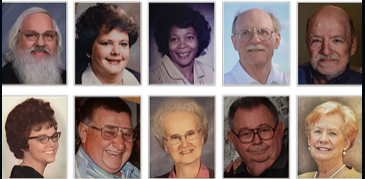USA Today reports on its analysis of Covid-19 deaths in nursing homes last winter, with a focus on Trilogy Health Services

Some Trilogy Health Services residents who died of Covid-19 (Photos contributed to USA Today)
—–
USA Today recently published its findings from an in-depth analysis that looked at Covid-19 nursing home deaths during the 2020-21 winter surge, with a focus on one company that had twice the national average of deaths for nursing homes and has as many as 20 facilities in Kentucky.
The year-long analysis was done by Letitia Stein, Jayme Fraser, Nick Penzenstadler and freelancer Jeff Kelly Lowenstein. It was published mid-March as a series of stories, titled “Dying for Care.”
USA Today says, “In a first-of-its-kind analysis, they identified nursing-home ownership webs invisible to consumers. They scored the performance of every nursing home in America to probe questions of corporate responsibility left unanswered by government regulators and dozens of research papers on the pandemic’s 140,000-plus nursing home deaths.”
The series opens with pictures of people who died in nursing homes of Trilogy Health Services, found to have the “highest death rates reported by any large nursing home chain at the height of the pandemic.”
The analysis found that residents in Trilogy’s 115 homes died of Covid-19 last winter at twice the national average for nursing homes, based on figures facilities must file weekly with the federal government.
After being presented with USA Today’s findings, the company told the newspaper that it had mistakenly reported hundreds of deaths during the surge and offered a revised tally that reduced the count by more than 40 percent, but it declined to provide documentation of those claims. It has since “filed new numbers with the federal government and hired a consultant to help it review its death count,” the newspaper reports.
But even with those lower numbers, the newspaper reported that Trilogy’s Covid-19 death rates were “well above the national average” during the winter surge.
The paper’s analysis found that the deaths were not driven by residents who were older or more fragile, and could not be explained solely by the company’s presence in states hard-hit by the virus. An unusual distinction was that Trilogy had been acquired by a company specializing in real estate in a test of a business model new to large nursing-home chains.
The analysis found that “millions of dollars continued to flow from Trilogy to a California-based real estate venture busy preparing its next investment pitch – a stock listing expected to launch this year.”
The story digs into the business model behind these nursing homes and their efforts to increase profits, including staff cuts. It says Trilogy “went further than any other major chain in shrinking care hours delivered to residents before the pandemic,” that “half of its facilities were cited by health inspectors for violating Covid-19 safety rules in 2020” and that “Trilogy’s poor Covid outcomes stood out by measure after measure.”
The company divided its facilities “into red, yellow and green zones to limit exposure to the virus,” the story says, but “Eyewitness interviews and the reports filed by health inspectors indicate this safety regimen was often a charade.” The story also includes interviews with families of those who died.
The series also includes
short stories about some of the Trilogy residents who died and another includes a
video of families reflecting on their loss. In addition, there is a
link to share the story of how you lost a loved one in a nursing home due to Covid-19.
Also in the USA Today “Dying for Care” series:
The reporters
break down their findings into four key things to know about their investigation into nursing home failures during Covid-19, including why Trilogy stood out, impact of staffing on care, impact of ignoring safety lapses pointed out in inspections, and impacts from the real-estate business model.
In response to the story, federal nursing home regulators have said they need to collect better information about real estate ownership model’s like Trilogy’s, they report. Further, President Joe Biden
proposed reforms in February that would track problem owners across states and shed light on Wall Street profits from nursing homes.
The analysis revealed ownership webs invisible to consumers and said “problems across chains eluded federal officials overseeing nursing homes, who were focused on individual facilities during the pandemic.”
A story by Fraser walks through the details of how they did the analysis. She writes that USA Today took a closer look at nursing-home performance in the winter surge from October 2020 to February 2021 because half the nation’s 140,000 Covid-19 deaths in nursing homes happened during that period, “months after best practices were established and federal aid issued for coping with the coronavirus.”
Another
story, written by Penzenstadler, offers a guide to choosing the right nursing home for a loved on in three steps.
Penzenstadler also
explores the question, “When does a nursing home Covid-19 death count?”
There is also a section that allows you to look up nursing-home ratings from the analysis and see how they fared during the pandemic’s winter surge, 2021-21.
There are no Kentucky data in the spreadsheet; USA Today reports there are 13 Trilogy Health Services facilities in Kentucky, but its
website lists 20:
Cooper Trail Senior Living in Bardstown;
Cedar Ridge Health Campus in Cynthiana;
Walker’s Trail Senior Living in Danville;
The Willows at Harrodsburg;
The Springs at Oldham Reserve in La Grange;
The Willows at Citation in Lexington;
The Willows at Fritz Farm in Lexington;
The Willows at Hamburg in Lexington;
Forest Springs Health Campus in Louisville;
Franciscan Health Care Center in Louisville;
Glen River Health Campus in Louisville;
Park Terrace Health Campus in Louisville;
The Legacy at English Station in Louisville;
The Springs at Stony Brook in Louisville;
The Willows at Springhurst in Louisville;
Westport Place Health Campus in Louisville;
Sanders Ridge Health Campus in Mt. Washington;
Calumet Trace Senior Living in Owensboro;
Shelby Farms Senior Living in Shelbyville; and
Boonesboro Trail Senior Living in Winchester.
